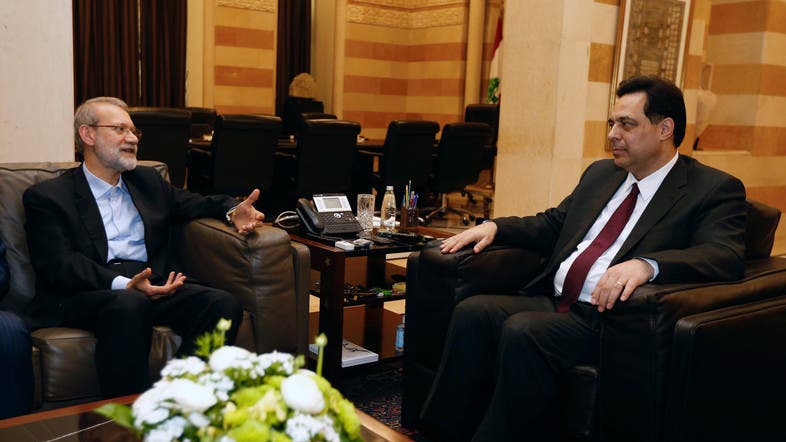Iran makes empty promises to Lebanon
Hanin Ghaddar/Al Arabiya/February 21/2020
حنين غدار/وعود فارغة من إيران للبنان
While Lebanon was preparing itself for the International Monetary Fund’s visit – Iranian parliament speaker Ali Larijani flew to Lebanon to meet with Hezbollah’s Chief Hassan Nasrallah. In addition, he held talks with President Michel Aoun in Baabda Palace and relayed to him a message from Iranian President Hassan Rouhani.
According to media reports, the message included means to enhance Lebanese-Iranian relations and involved an invitation to President Aoun to visit Tehran. Larijani also expressed Iran’s willingness to help improve the economic situation in Lebanon.
Between Larijani’s visit and the IMF meeting, Lebanon seems to be at a crossroads where its leadership has to choose between opening up again to the international community, and getting the help it needs to revive its crumbling economy, or move further under Iran’s umbrella and turn into a failed state that would be the Middle Eastern version of Venezuela.
This crossroads is clearly visible by the wide gap between the Lebanese people who have been expressing their frustration in the streets for four months, and the Lebanese political class that still hopes its allegiance to Iran won’t be too costly. It is this same gap that draws the difference between the people who have realized that Iran only brought instability and isolation to Lebanon, and a political class that has not yet realized the repercussions of Hezbollah’s control over Lebanon’s state institutions.
Between Iran and the West, Lebanon cannot chose Iran at this point, for two main reasons.
First, Iran has its own financial crisis, and Larijani’s promises are empty promises that will never be translated into a real program that could save Lebanon from collapse. Iran has already cut its funding to Hezbollah by half, and now relies on Iraq’s resources and economy to fund Hezbollah and its other operations in the region.
Hezbollah was forced to fund its own alternative funding resources and has been relying more heavily on smuggling and illegitimate business deals to survive its own crisis.
Hezbollah has cut salaries, fired contractual and unnecessary employees, and has also shrunk its social services network to cater to a much smaller circle of beneficiaries. If Iran can’t help Hezbollah, then Iran can never help Lebanon.
Second, Iran has always benefited, and will continue to benefit from Lebanon’s resources, not vice versa. Iran used Lebanon’s resources to fund the corruption networks of its allies, mainly the Amal Movement and the Free Patriotic Movement. Iran isolated Lebanon from its Arab depth and the international community when it decided that Hezbollah should go to Syria and have a larger role in the region.
Iran wants Lebanon to be the core of its regional operations, and when it had the financial means – before the US sanctions – only Hezbollah benefited, never Lebanon. Iran wants Lebanon to pay the price for its regional hegemony but will not help Lebanon, economically or diplomatically. Yet, Larijani expects the Lebanese to believe that this time around – and in the midst of the Iranian financial crisis – things will be different.
Of course, the IMF plan to salvage Lebanon is not going to be easy or painless. But at least it will push Lebanon to implement much needed reforms and anti-corruption measures. Western and Gulf Arab states that helped Lebanon in the past have made clear that any future financial assistance depends on Lebanon implementing serious reforms to address root causes of the crisis such as state corruption and bad governance.
Interestingly, Hezbollah hasn’t commented on the IMF visit, and its milieu still insists that it is only an advisory mission that will not involve practical steps. But while the Lebanese people – including Hezbollah’s constituency are feeling the hardship and the increased unemployment due to the failing economy – Hezbollah launched a widespread campaign to boycott American products, in response to the US policy against Iran and the assassination of the Quds Force Commander Qassem Soleimani.
As this campaign takes to the social media and a few local shops and consumers, Hezbollah will eventually realize that all its efforts to salvage its image as the protector of Lebanon and the father-figure of the Shia community will eventually backfire. The Lebanese – including the Shia – have finally realized that Iran’s resistance economy and policies did not put more food on the table. Instead, it pushed the Shia to regional wars, isolated Lebanon, and led to the collapse of Lebanon’s fragile economy.
Lebanon’s protests have been about the aspiration to citizenship, not sectarian identities, and ultimately, everyone in Lebanon – including Hezbollah’s own constituency – are very much aware only the West and the Gulf States – not Iran – can help Lebanon.
*Hanin Ghaddar is the inaugural Friedmann Visiting Fellow at The Washington Institute’s Geduld Program on Arab Politics, where she focuses on Shia politics throughout the Levant. She tweets @haningdr.






















